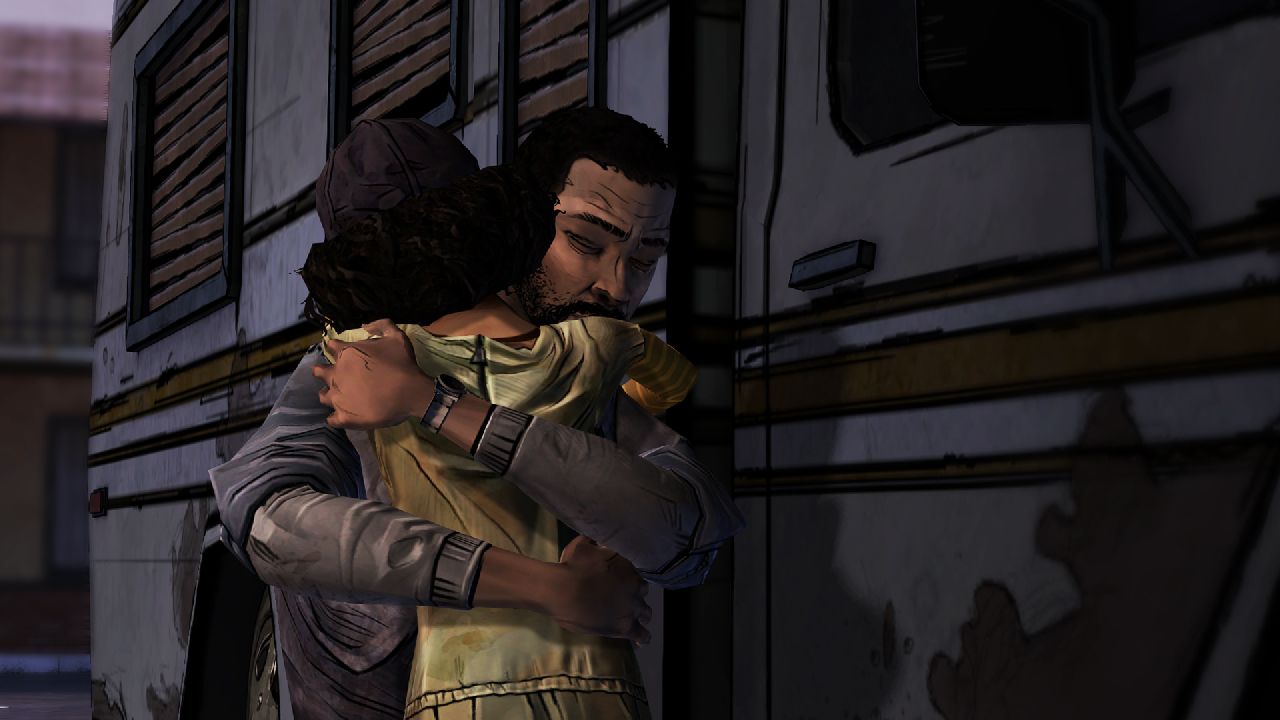I suppose everything that needs to be said about the Telltale's The Walking Dead (not to be confused with Robert Kirkman’s The Walking Dead comic; AMC’s The Walking Dead show; or Norman Reedus’ The Walking Dead game, the adventures of Norman Reedus, starring Norman Reedus*) has already been said by the flock of vultures that is games media. So yes you already know that Telltale’s The Walking Dead has a great art style, great music, well-rounded characters, an emotionally resonant story, powerful choice moments, does a good job of portraying race in games, does a good job of portraying children in games, is arguably one of the best games of 2012 as well as Telltale’s magnum opus, and overall elevates games as an artistic medium. I’m not going to touch on most of that. I’m really just here because I’m cutting a little too close to my deadline and I didn’t want to take the gamble of writing a joke review accusing the indie puzzle game Triple Town of being Illuminati/alien/masonic/homo-reptilian propaganda. So, with that in mind let’s venture into the charted and entirely safe waters of kissing Telltale’s ass.
Telltale’s The Walking Dead: Season one was developed and published by Telltale studios, the makers of the Sam and Max series and that not particularly horrible, but not particularly great Back to the Future series. Not wanting to change what ain’t broke, The Walking Dead Season one was released in five parts over a fucking wide array of consoles including: Android, iOS, the Kindle Fire HDX (You can get games on that? I thought those were for E-books), Mac OS X, Microsoft Windows, Ouya (which is good news for the three people who bought an Ouya) ,Playstation 3, Playstation 4, Playstation Vita, Xbox 360, and the Xbox One over the course of 2012 to 2013. This review covers the PC version, which is currently selling on Steam for $24.99.
And so we return to Robert Kirkman’s world of the Walking Dead (or as it’s also known, Mad Max for for normal people), where a history professor named Lee Everitt is being driven to prison for the murder of his wife’s lover on that iconic road to Atlanta, Georgia the day the zombie virus (or bacteria, fungus, act of god, whatever; they never specify it in the comics) breaks out. The cop car he’s in hits a walker and crashes, swerving off the road and leaving Lee unconscious.

When he wakes up, he quickly gets overwhelmed by walkers and takes shelter in a nearby suburban house, where he meets the game’s poster-child and other main character, a little girl named Clementine. Together they are forced to work together to survive the apocalypse and end up witnessing humanity’s dark nature.

Gameplay was never really Tell-tale’s strong suit. Their rather unsurprising aspirations are simply telling tales and while that mindset does leave the gameplay starve while chained up to the radiator, the story definitely makes up for it. While I definitely do not support the story when taken on it’s own, it does a good job of supporting the game’s narrative and because of that I will fight to the death defending it; both from the mountain dew drinkers who say that TT’s the Walking Dead isn’t a game and the sort of smug, self-aggrandizing fans of old school adventure games who believe spamming a screen with clicks and then proceeding to spend hours rubbing various objects together in hopes of causing a reaction that will excell some half-baked plot is an accurate gauge of intelligence and that Telltale abandoning this model is heresy. The Walking Dead’s gameplay really boils down to two things: ‘do the thing that makes the thing happen’ and ‘hair-raising split second decision making’. Yeah, it’s not all that great when taken on it’s own, but it helps deliver a story that just doesn’t screw around and will move even the most jaded motherfucker.
The gameplay mostly boils down to walking around, talking to people, and pocketing anything that isn’t nailed down, like a kleptomaniac at a cocktail party. I don’t really have any major problems with the gameplay other than walking around. The game’s reliance on a fixed camera system (think old Metal Gear Solid games) makes movement, especially with WASD or a d-pad, very difficult. This is only made worse by the fact that you don’t have a sprint function because Lee just moves too damn slowly (and yes I know it causes a little bit of ludonarrative dissonance, but it’s fucking worth it if I don’t have to spend ten years watching Lee’s fat ass move from one place to another because we don’t know where to go and we’re too proud to look it up).
And now, on to the story that I haven’t been able to shut up about. The best argument for the Walking Dead’s story is that it when all is said and done I felt compelled to just wheel away from my desk and think; think about where I came from and the choices I made in the game and anything that has the capacity to really make a person sit around and ruminate is really worthwhile. The story was captivating, the characters were probably some of the most well-rounded ever put into a game. Other than Clem, Duck, and the standard issue post-apocalyptic stone cold crazy motherfuckers I don’t really think anybody in the game could have been described as anything other than morally gray and I like that, because that’s how people are when you strip away the safety society brings: panicky, self-centered, and quick to judge.

Okay, so the story was great, but why should you care? I’ve experienced great stories before and this is all based on your subjective opinion anyways, so who really knows what’s what? Well those are some good arguments, reader. I have a good rebuttal for the first one, but all I have to say about the second is that if you don’t trust my subjective opinion I recommend you exercise your right to fuck right off, because I am who I am and I can’t be someone else. Believe me, I tried to be Warren Buffet, but apparently that’s a crime called forgery. Now if you’re wondering why the story here is worth experiencing I have one word: novelty. Yeah, you’ve read good stories in books, watched some good films, but those were non-interactive media (unless you count Dora the Explorer and if you do, I hate to break this to you, but she could never actually hear you; it’s a horrible lie, I know). Telltale’s the Walking Dead forces (and I chose that verb to imply a lack of consent) the player into the story. That’s the reason why people say that it elevates games as an artform, because it provides a narrative that couldn’t be delivered through a TV show or a comic book. The game forces the player to make tough decisions that reflect who they are as people, not just ‘Ashley or Kaiden’ or ‘NCR, House, independent or Legion’.
One quick thing before we wrap this up: If you want to watch the show or follow the real continuity - I mean read the comics and you’re worried about spoilers, don’t be. Basically the only stuff that spills over from Rick Grimes’s storyline is Glen, who shows up as a minor character in the beginning and a brief bit where you go to Hershel’s farm and see one of his kids die. I’m giving that one away because honestly that doesn’t spoil the comic and nobody really cares about any of his kids other than Maggie. Oh and also the cop in the beginning references one of the dudes from the prison. Yeah, so if you like the main story (whether you follow AMC’s interpretation of it or the right one) you won’t have to worry about this screwing anything up for you.
So that’s Telltale’s the Walking Dead for you: an emotional roller coaster that will mess you up. I strongly recommend this game for any mature player.
* : Or, as I call it, the Norman Reedus Masturbation Aid.


